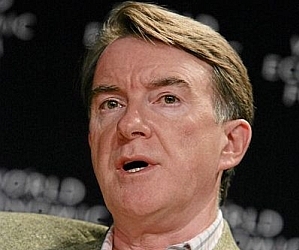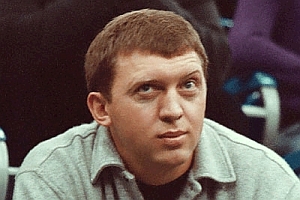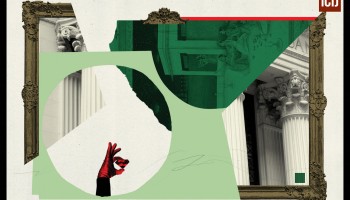 Peter Mandelson - Credit: Annette Boutellier / WikimediaOpposition politicians have asked Mandelson to list all his engagements with Deripaska during the four years that Mandelson was EU trade commissioner, and to talk about whether he discussed aluminum with Deripaska, whose companies benefitted from lower EU tariffs on aluminum while Mandelson served as trade commissioner.
Peter Mandelson - Credit: Annette Boutellier / WikimediaOpposition politicians have asked Mandelson to list all his engagements with Deripaska during the four years that Mandelson was EU trade commissioner, and to talk about whether he discussed aluminum with Deripaska, whose companies benefitted from lower EU tariffs on aluminum while Mandelson served as trade commissioner.
The story broke earlier this month, when Mandelson joined Prime Minister Gordon Brown’s cabinet and had to answer questions about attending a summer party on Deripaska’s yacht this summer. His answers – that he’d stayed for drinks only briefly, and that he’d known Deripaska for two years – were countered by friends who said that he had been an overnight guest on the yacht, and that his connection with Deripaska went back to at least January 2005, months before Mandelson signed off on a Commission decision to remove a 14.9 percent tariff that Deripaska’s company, Rusal, had been paying on aluminum foil. Mandelson also later proposed that tariffs on aluminum imports be reduced from 6 percent to 3 percent.
EU Resists Calls to Tighten Conduct
“My job as trade commissioner is to make contacts with senior economic and business leaders in economies like Russia’s,” Mandelson had previously told the Financial Times. Now, however, he has told the press that private meetings should not come under scrutiny. When asked if he would resign over the scandal, Mandelson told Reuters, “No, that is a fantasy.” The European Commission has also resisted calls from a British European Parliament member to tighten the code of conduct governing commissioners.  Oleg Deripaska - Credit: Gaura / WikimediaDeripaska, 40, is one of Russia’s richest oligarchs and has had his own share of controversy. A recent UK High Court judgment on a lawsuit brought by Deripaska’s former partner detailed the alleged social and business links between Deripaska and reputed Russian mobster Anton Malevsky, whose brother Andrei had a 10 percent share in Deripaska’s company. The United States revoked Deripaska’s visa in 2006, allegedly because of pressure from the FBI. In 2000, three small Russian metals trading companies filed a $3 billion racketeering suit in New York against Deripaska’s company for illegally seizing a Siberian plant, murder, extortion and mail and wire fraud. More recently, the US and the UK acknowledged that their law enforcement is also investigating Deripaska for a $57.5 million wire transfer routed through Barclays Bank in New York and London. Deripaska has denied any wrongdoing.
Oleg Deripaska - Credit: Gaura / WikimediaDeripaska, 40, is one of Russia’s richest oligarchs and has had his own share of controversy. A recent UK High Court judgment on a lawsuit brought by Deripaska’s former partner detailed the alleged social and business links between Deripaska and reputed Russian mobster Anton Malevsky, whose brother Andrei had a 10 percent share in Deripaska’s company. The United States revoked Deripaska’s visa in 2006, allegedly because of pressure from the FBI. In 2000, three small Russian metals trading companies filed a $3 billion racketeering suit in New York against Deripaska’s company for illegally seizing a Siberian plant, murder, extortion and mail and wire fraud. More recently, the US and the UK acknowledged that their law enforcement is also investigating Deripaska for a $57.5 million wire transfer routed through Barclays Bank in New York and London. Deripaska has denied any wrongdoing.
Opposition Faces Questions, Too
The British opposition has had its own problems related to Deripaska. Conservative Party number two George Osborne has denied soliciting donations to the party while onboard Deripaska’s yacht in Corfu last year, but admitted that it “didn’t look good” and that it was a “mistake.”
The party also faces scrutiny over donations of more than $91,000 from a British businessman who runs a holding company for the assets of a Ukrainian billionaire enmeshed in a battle over the control of gas supplies from Russia to countries in Western Europe. The Ukrainian, Dmitry Firtash, owns 45 percent of RosUkrEnergo, which until recently had a monopoly over imports of gas from Russia to Ukraine and on to European Union countries. The company has been investigated by the US Department of Justice for links to international criminal Semyon Mogilevich.





